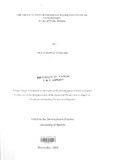| dc.description.abstract | This study investigates the implication of improved water provision on livelihoods. It focuses on Mutito Division as a case study. The study moves from the premise that improved water provision will have an effect on the activities that people are able to engage in. The study looked at water not just as a basic need for healthy growth but also as productive asset that can help people improve their living standards. The objectives of the study is to establish the main sources of water for the residents of Mutito Division and to analyse the effects of improved water provision on the livelihoods of the people living in the area.
The data was obtained from both the primary and secondary sources. For the primary data, structured questionnaires for household heads were administered to ninety respondents. The respondents were sampled from three sub-locations namely: Malatani, Kawala and Kitoo sub-locations in Mutito Division. Four key informants were administered unstructured questionnaires and provided detailed information on key issues in the study.
The secondary data was obtained from books, articles, journals and reports of similar studies carried out elsewhere. Both descriptive and inferential statistics were
computed using SPSS computer programme. The tables and figures generated were explained and backed up with literature. The fmdings indicated that the residents of Mutito Division depended on rivers, springs, shallow wells, boreholes and sand dam as their sources of water. Improved water sources were found to have an effect on the livelihood activ-ities that they were able to engage in.
Even with little water available, they were able to improve on the activities that they engaged. Improved water provision was helping reduce the occurrence of water borne diseases and with water more parents were able to fmance the education of their children. The study came up with some recommendations. Among them is the need to improve on water provision in Mutito Division to help alleviate poverty. There is need for corroboration in organisations working in water provision. Also need to improve infrastructure and training to enhance livelihood activities in the area. | en_US |

